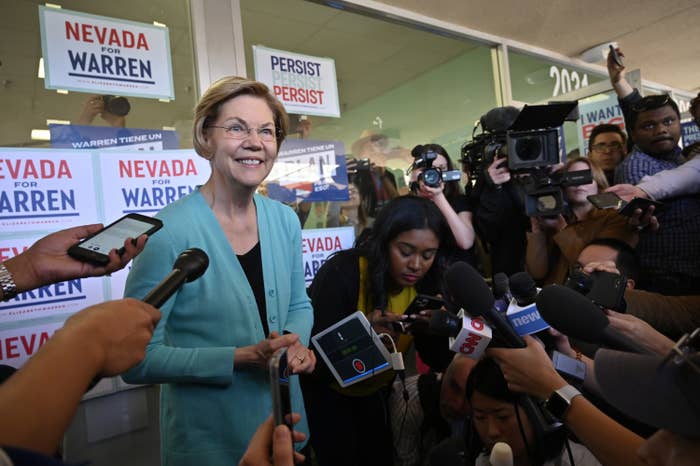
LAS VEGAS — Sen. Elizabeth Warren is a longtime critic of the big-money organizations known as super PACs — and of candidates who are supported by them. But she reversed course on Thursday and refused to disavow a super PAC, called Persist PAC, created to support her presidential campaign.
It was a change so sudden that Warren's own campaign website still said the Massachusetts senator "rejects all super PACs" and "would disavow any super PAC formed to support her in the Democratic primary." She had criticized other candidates for them as late as last week on the debate stage in New Hampshire.
Warren told reporters she had called "dozens" of times for other candidates to agree not to accept the support of super PACs, with no success.
"So here’s where I stand: If all the candidates want to get rid of super PACs, count me in — I’ll lead the charge," she told reporters at a campaign stop Thursday. "But that’s how it has to be. It can’t be the case that a bunch of people keep them and only one or two don’t."
She connected the issue directly to gender, noting that the Democratic field was stocked with male candidates who were either billionaires or backed by big-money organizations.
"We reached the point a few weeks ago where all of the men who were on the debate stage all had either super PACs or they were multibillionaires who could rummage around in their sock drawers and find enough money to be able to fund a campaign, and the only people who didn’t have them were the two women," she said.
"At that point, there were some women around the country who said, 'That's just not right.'"
Bernie Sanders has a big-money group, Our Revolution, that functions similarly to a PAC, and is able to raise unlimited sums of money on his behalf. As a nonprofit, it does not have to disclose its donors, unlike super PACs. He's also supported by the country's largest nurse's union, National Nurses United, whose super PAC spent $5 million backing him in 2016.
Persist PAC booked nearly $800,000 in television ads for Warren this week, as her own campaign faces tight finances in the wake of disappointing finishes in the early states of Iowa and New Hampshire.
She got a much-needed personal infusion of cash after a dominant debate performance Wednesday, raising $2.8 million — her campaign's biggest fundraising day by far. But she will need much larger sums of money to compete on Super Tuesday in early March, when big, delegate-rich, and expensive states like California and Texas will go to the polls.
Super PACs, which can raise unlimited sums of money for candidates, are by definition independent; they are legally prohibited from coordinating with campaigns. Technically, candidates have zero control over the groups. But practically, candidates can hamper them by openly disavowing them or calling for them to stop spending money on their behalf. Some campaigns have also found ways for years to skirt regulations to guide a super PAC's direction.
Just a few months ago, Warren took a different stance with an outside group supporting her campaign. When dark money group Women.Vote bought ads backing Warren in Iowa, her campaign disavowed the organization's activities to Politico. The campaign, a spokesperson said, “was not aware of this and asks that those involved immediately stop purchasing advertisements of any kind. Elizabeth Warren believes democracy is undermined by anonymous, dark-money attempts to influence voters — whether that influence is meant to help or hurt her candidacy.”

